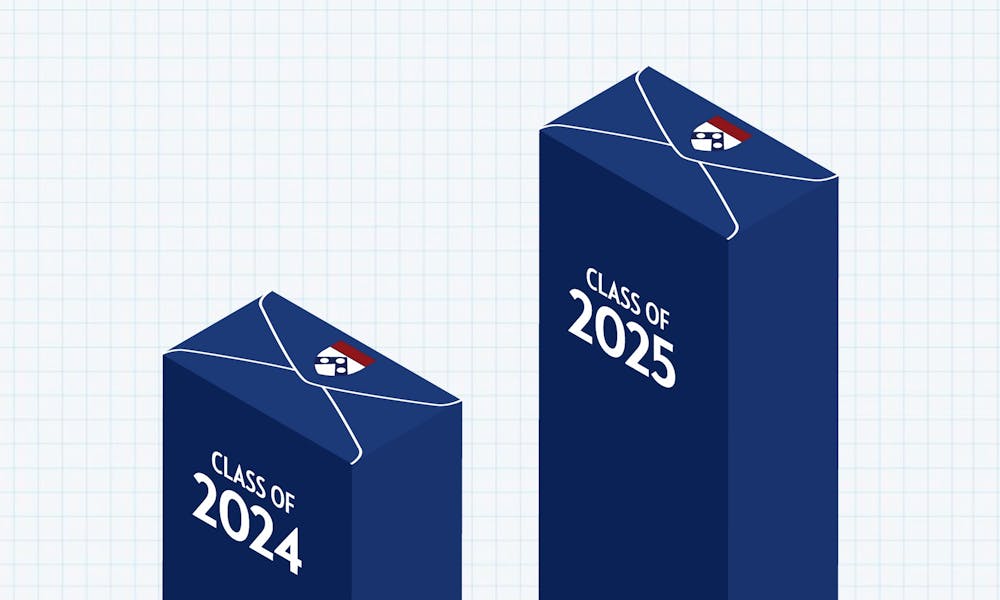Penn received an all-time high of 56,000 applications for the Class of 2025, a 34% increase from last year's applicant pool.
The large applicant pool, likely influenced by test-optional policies enacted in the wake of COVID-19, is set to result in Penn's lowest-ever acceptance rate, according to Penn Admissions.
"With just the sheer increase in application volume, and the fact that we're not increasing the size of the class, I expect that this will be a selective year — not only more selective than last year, but probably more selective than two years ago, which was our most selective year," Interim Dean of Admissions John McLaughlin said.
The Ivy League — which saw a collective spike in applications — postponed its coordinated decision release date by six days to April 6. Students will have until May 3 to declare their enrollment, a two-day extension from the traditional May 1 deadline.
McLaughlin, who assumed his interim role on Jan. 1 after former Dean of Admissions Eric Furda departed Penn, said that the extended decision release date will allow the admissions office ample time to review the University's largest set of applications.
"It gives us a little bit more flexibility in order to make sure that not only are we able to review all of these applications, but we're able to review these applications in a thoughtful way that's consistent with our desire to review every application on an individual basis and consider all sorts of different parts of the applicant," McLaughlin said.
Despite the large influx in applications, the admissions office is not currently planning to increase the total admitted class size beyond the usual 2,400 student target — which McLaughlin said will likely cause Penn's acceptance rate to fall to a record low.
Penn accepted 8.07% of applicants to the Class of 2024, the first time the acceptance rate ticked upward from the previous year in five years. Penn's lowest-ever acceptance rate was for the Class of 2023, where 7.44% of applicants were offered admission. Penn admitted 8.39% and 9.15% of applicants to the Class of 2022 and Class of 2021, respectively.
In December, Penn accepted 15% of applicants to the Class of 2025 through its early decision program, a record-low. 7,962 students applied through the University's early decision program, a 23% increase from the previous year's 6,453 applicants.
Several factors may have contributed to the spike in application numbers, Associate Director of Admissions Sara Cohen said. Along with many other institutions, Penn adopted a test-optional policy for the Class of 2025, no longer requiring applicants to submit SAT or ACT scores with their applications. Penn will adopt the same policy for the Class of 2026.
Cohen added that some students may have applied to more schools than usual this year because they may have had trouble narrowing down their top institutions as the pandemic eliminated the possibility of campus visits.
"Your average college applicant is applying to more colleges this year than they might have — perhaps due to test-optional, perhaps because they were not able to visit a campus. There may be more uncertainty on what are their top choices," Cohen said. "If your average college applicant is applying to more colleges this year, then your average college institution is seeing an increase in applications."
Due to the high number of applications, McLaughlin said the admissions office likely will not have time to fact check applications and may opt to discard applications that raise questions about honesty. Penn Admissions told The Daily Pennsylvanian in 2019 that due to the large number of applications the University receives, there is not enough time to properly fact-check each application, particularly as fabrications are uncommon.
"If there are questions or apprehensions around the veracity of an application, that might not be an application that we feel comfortable moving forward with, especially knowing that we have 56,000 other applications with which to consider, and many of whom are wholly accurate and truthful," McLaughlin said.
McLaughlin said the pandemic has prompted the admissions office to anticipate a "new normal," which he anticipates will continue through the next several admissions cycles.
"I wouldn't say that next year we're necessarily going to be even more selective or less selective, but I think that next year is probably going to be consistent with this year," McLaughlin said.









